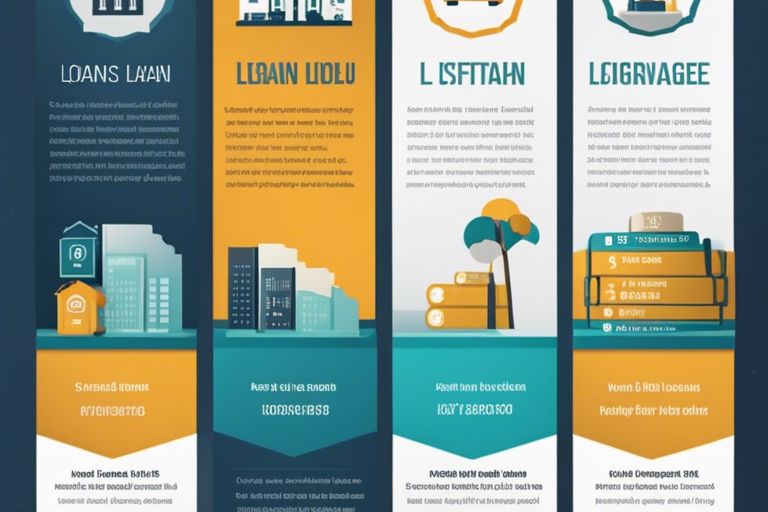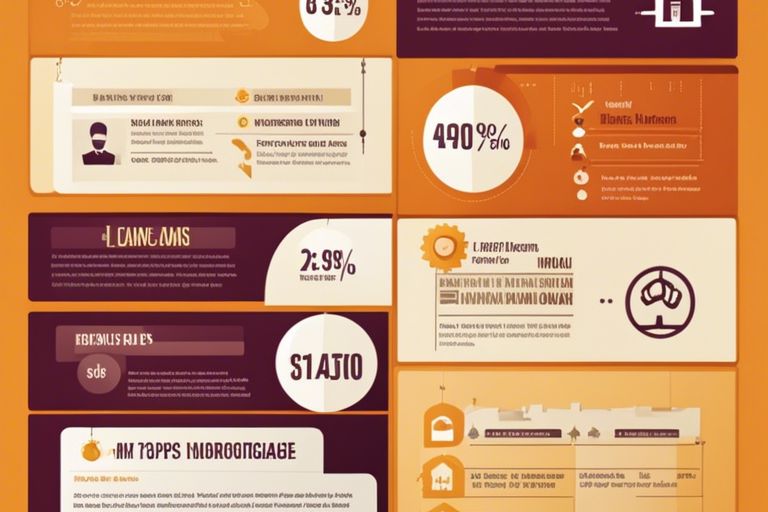Just dipping your toes into the world of loans can be confusing and overwhelming, with so many options out there. From personal loans to student loans, home loans to auto loans, each type has its own features, benefits, and risks. In this comprehensive guide, we’ll break down the different types of loans available, explore their pros and cons, and help you navigate the complexities of borrowing money. Whether you’re looking to finance a major purchase or consolidate your existing debts, understanding the nuances of each loan option is crucial to making informed financial decisions. So buckle up, because we’re about to demystify the world of loans!
Key Takeaways:
- Know the Difference: It is crucial to understand the distinction between various types of loans, including personal loans, mortgages, student loans, and auto loans. Each type serves a different purpose and comes with its own set of terms and conditions.
- Budget Wisely: When considering taking out a loan, make sure to assess your financial situation carefully. Create a budget plan that includes loan repayments to ensure you can afford them without causing financial strain.
- Shop Around: Before committing to a loan, compare offers from different lenders to find the best interest rates and terms. This will help you save money in the long run and ensure you choose the most suitable loan for your needs.
The Big Players: Secured vs. Unsecured Loans
Mortgages: Your Home on the Line
Even before you start considering buying your dream home, you need to understand the power of mortgages. Mortgages are secured loans where your home is the collateral. This means if you fail to make payments, the lender can take possession of your house. It’s crucial to assess your financial situation and ensure you can commit to the monthly payments to avoid losing your home.
Auto Loans: Financing Your Ride
The automobile industry thrives on the availability of auto loans. The process involves securing a loan for a vehicle purchase, where the car itself acts as collateral. The key here is to ensure you understand the terms of the loan, including the interest rate and repayment schedule. The last thing you want is to be driving a car you can’t afford!
While secured auto loans may offer lower interest rates due to the collateral involved, remember that defaulting on payments can lead to repossession of your vehicle. It’s crucial to stay on top of your payments to maintain ownership of your ride and avoid any negative impact on your credit score.
The Personal Loan Playbook
The 8 Different Types of Loans You Should Know can be a game-changer when you understand how they work. Whether you’re looking to borrow money for a specific purpose or to consolidate debt, knowing your options is key to making smart financial decisions.
Signature Loans: Autograph Your Way to Cash
Signature loans, also known as personal loans, are unsecured loans that require no collateral. All you need to do is sign on the dotted line, and the cash is yours. These loans are based solely on your creditworthiness, so make sure your credit score is in tip-top shape to score the best interest rates.
Peer-to-Peer Lending: Crowdsource Your Credit
To tap into the wisdom of the crowd, consider peer-to-peer lending. Platforms like Prosper and LendingClub connect you with individual investors willing to fund your loan. It’s a win-win situation where you get the cash you need while investors earn competitive returns. Just make sure to read the fine print and understand the risks involved.
Autograph: Recall, personal loans and peer-to-peer lending can be great options for getting the cash you need, but be sure to borrow responsibly. Stay on top of your payments to avoid damaging your credit score, and always read the terms and conditions carefully to avoid any surprises down the road.

The Student Debt Scene
Federal Student Loans: Uncle Sam’s Offer
Scene: Let’s talk about Federal Student Loans, the bread and butter for many students navigating the treacherous waters of higher education costs. Uncle Sam’s offer might seem like a savior with lower interest rates and flexible repayment options. But remember, defaulting on these loans can have serious consequences, including wage garnishment and damaged credit scores.
Private Student Loans: Banking on Education
Education: Now, let’s investigate the world of Private Student Loans – a domain where things can get murky real quick. While these loans can offer more flexibility and might cover your education costs, tread carefully. Interest rates can be sky-high, and terms are often less forgiving than federal loans.
Loans: Private student loans can be a double-edged sword. On one hand, they can provide the funds needed to pursue your education dreams beyond what federal loans cover. However, the devil is in the details – read the fine print, understand the terms, and beware of variable interest rates that can skyrocket your payments. Approach these loans with caution and a clear understanding of the risks involved.
The Business Loan Breakdown
SBA Loans: Small Business, Big Dreams
Dreams are what drive small business owners to pursue their passions and make a mark in the world. With SBA loans, these dreams can become a reality. SBA loans are government-guaranteed loans that provide small businesses with access to funding that they may not otherwise qualify for through traditional lending channels. These loans offer competitive interest rates and flexible terms, making them a popular choice for entrepreneurs looking to grow their businesses.
Lines of Credit: Flexibility for Your Business
Loan flexibility is crucial for businesses to navigate through the ups and downs of the market. Lines of credit provide that flexibility by allowing businesses to access a predetermined amount of funds as needed. Your business can draw funds up to the limit, repay, and redraw again, making it a versatile financing option. However, it’s important to note that relying too heavily on lines of credit can lead to a dangerous cycle of debt.
Specialized Lending Strategies
Payday Loans: The Quick Fix with Risks
Many folks turn to payday loans as a quick solution to financial emergencies. These short-term, high-interest loans can seem like a lifesaver, but they often come with hidden risks.
With payday loans, you can get cash fast without a credit check or lengthy approval process. However, the convenience comes at a cost. The interest rates on these loans can be astronomical, leading borrowers into a cycle of debt that can be hard to escape.
Home Equity Loans: Tapping into Your Castle
Many homeowners consider home equity loans as a way to tap into the value of their property for big expenses like home renovations or debt consolidation.
With a home equity loan, you can borrow against the equity you’ve built up in your home. This type of loan typically offers lower interest rates than other forms of credit, making it an attractive option for those looking to access a large sum of money. Plus, the interest you pay may be tax-deductible, providing potential savings for homeowners.
However, it’s important to remember that with a home equity loan, you are putting your home on the line as collateral. Missing payments could result in foreclosure, putting your home at risk.
Summing up
With this in mind, it’s crucial to understand the different types of loans to make informed financial decisions. Whether you’re looking for a mortgage, personal loan, student loan, or business loan, knowing the nuances of each can help you save money and avoid unnecessary risks. Be mindful of, it’s crucial to compare interest rates, terms, and fees before committing to any loan. By arming yourself with this knowledge, you can navigate the world of borrowing with confidence and take control of your financial future. Stay educated, stay mindful, and always prioritize your financial well-being.
FAQ
Q: What are the different types of loans available?
A: There are various types of loans available, including personal loans, home loans, auto loans, student loans, and business loans.
Q: How do personal loans differ from other types of loans?
A: Personal loans are unsecured loans that can be used for any purpose, while other types of loans are often secured by collateral, such as a home or car.
Q: What is the difference between fixed-rate and adjustable-rate mortgages?
A: Fixed-rate mortgages have a set interest rate that remains the same throughout the loan term, while adjustable-rate mortgages have an interest rate that can fluctuate based on market conditions.
Q: How do payday loans work?
A: Payday loans are short-term loans that typically must be repaid on the borrower’s next payday, often with high interest rates and fees.
Q: What are the key factors to consider when applying for a loan?
A: Key factors to consider when applying for a loan include interest rates, fees, loan terms, repayment options, and the lender’s reputation and customer service.
Q: How can I improve my chances of loan approval?
A: To improve your chances of loan approval, maintain a good credit score, provide accurate and complete information on your application, and show a stable income and employment history.
Q: What should I do if I am struggling to repay my loan?
A: If you are struggling to repay your loan, contact your lender immediately to discuss possible options, such as a revised repayment plan or loan modification.





